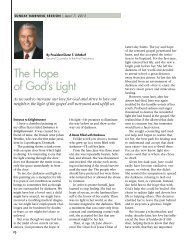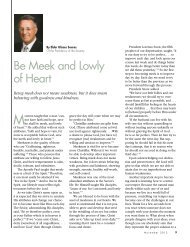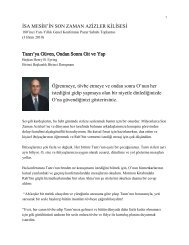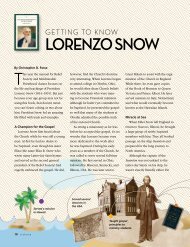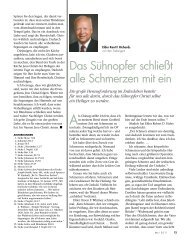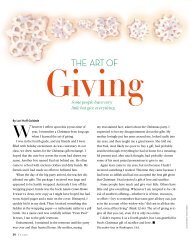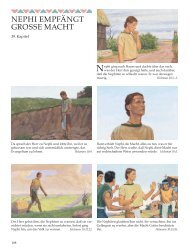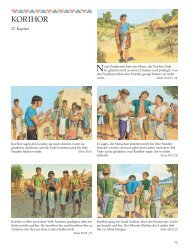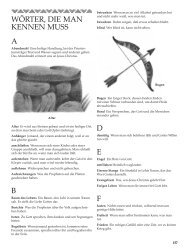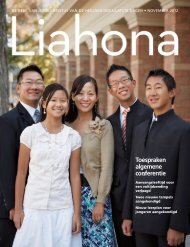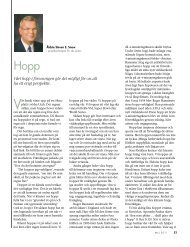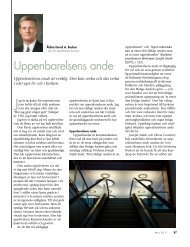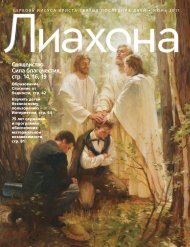August 2006 Ensign - The Church of Jesus Christ of Latter-day Saints
August 2006 Ensign - The Church of Jesus Christ of Latter-day Saints
August 2006 Ensign - The Church of Jesus Christ of Latter-day Saints
You also want an ePaper? Increase the reach of your titles
YUMPU automatically turns print PDFs into web optimized ePapers that Google loves.
LEFT: PHOTOGRAPH BY ROBERT CASEY, POSED BY MODELS; RIGHT: PHOTOGRAPH BY MATTHEW REIER, POSED BY MODELS<br />
All who come to this earth and obtain mortal<br />
bodies will be resurrected, but the glory and joy<br />
<strong>of</strong> eternal life in God’s presence are reserved for<br />
those “who overcome by faith” (D&C 76:53) in<br />
the Lord <strong>Jesus</strong> <strong>Christ</strong>. “We came to this earth<br />
that we might have a body,” the Prophet Joseph<br />
Smith taught, “and present it pure before God<br />
in the celestial kingdom.” 1<br />
Elder Dallin H. Oaks <strong>of</strong> the Quorum <strong>of</strong> the<br />
Twelve Apostles explained further: “We believe<br />
that the purpose <strong>of</strong> mortal life is to acquire a<br />
physical body and, through the atonement <strong>of</strong><br />
<strong>Jesus</strong> <strong>Christ</strong> and by obedience to the laws and<br />
ordinances <strong>of</strong> the gospel, to qualify for the<br />
glorified, resurrected celestial state that is<br />
called exaltation or eternal life.” 2<br />
Faith, Not Sight<br />
In our premortal life we were in God’s presence.<br />
We walked by sight. But in this life, as the Apostle Paul<br />
reminds us, “we walk by faith, not by sight” (2 Corinthians<br />
5:7). <strong>The</strong> scriptures teach us that “faith is . . . the evidence<br />
<strong>of</strong> things not seen” (Hebrews 11:1; emphasis added), and<br />
“if ye have faith ye hope for things which are not seen,<br />
which are true” (Alma 32:21). Walking by sight restricts<br />
our ability to develop and exercise faith.<br />
“Without faith it is impossible to please [God]”<br />
(Hebrews 11:6). Without faith in <strong>Jesus</strong> <strong>Christ</strong> we cannot<br />
be saved. While we lived in God’s presence, we were able<br />
to acquire and exercise a certain degree <strong>of</strong> faith, but we<br />
needed to leave His presence and have a veil drawn across<br />
our memory so we could develop the quality <strong>of</strong> faith<br />
necessary for us to lay claim upon eternal life.<br />
Moroni expands upon the idea that “faith is things<br />
which are hoped for and not seen,” explaining that God<br />
withholds sure knowledge from us until our faith has been<br />
tried: “Dispute not because ye see not, for ye receive no<br />
witness until after the trial <strong>of</strong> your faith” (Ether 12:6). To<br />
have our faith tried, then, is another major part <strong>of</strong> our purpose<br />
in leaving God’s presence and coming to earth.<br />
To pass the mortal<br />
test, we must<br />
repent <strong>of</strong> our<br />
sins, receive essential<br />
ordinances, make and<br />
keep covenants with<br />
God, and endure in<br />
righteousness to the end.<br />
“We Will Prove <strong>The</strong>m”<br />
<strong>The</strong> Pearl <strong>of</strong> Great Price gives an account<br />
<strong>of</strong> Abraham’s vision <strong>of</strong> the premortal existence.<br />
Speaking to the spirits “who were<br />
with him” in the premortal world, <strong>Jesus</strong><br />
<strong>Christ</strong> said, “We will make an earth whereon<br />
these may dwell; and we will prove<br />
them herewith, to see if they will do all<br />
things whatsoever the Lord their God shall<br />
command them” (Abraham 3:24–25). This<br />
life, then, becomes a proving ground, “a<br />
probationary state” (Alma 12:24), a time to<br />
show that we can lay hold upon the powers<br />
<strong>of</strong> <strong>Christ</strong>’s Atonement and become sanctified,<br />
as He is.<br />
This test <strong>of</strong> our faith determines<br />
whether or not we will “do all things whatsoever<br />
the Lord [our] God shall command [us].” To pass<br />
the mortal test, we must repent <strong>of</strong> our sins, receive essential<br />
ordinances, make and keep covenants with God, and<br />
endure in righteousness to the end. But the Lord is concerned<br />
not only with what we do in this life; He cares<br />
deeply about what we are and become. “<strong>The</strong> Lord requireth<br />
the heart and a willing mind” (D&C 64:34). He also<br />
requires each <strong>of</strong> us to become “a saint through the atonement<br />
<strong>of</strong> <strong>Christ</strong> the Lord” and become “as a child, submissive,<br />
meek, humble, patient, full <strong>of</strong> love, willing to submit<br />
to all things which the Lord seeth fit to inflict upon him”<br />
(Mosiah 3:19). He expects us to come unto Him and experience<br />
a “mighty change . . . in our hearts, that we have no<br />
more disposition to do evil, but to do good continually”<br />
(Mosiah 5:2).<br />
<strong>The</strong> true test <strong>of</strong> mortality is to see if we will accept<br />
the Savior wholeheartedly, apply His atoning blood in<br />
our lives, do “all we can do” (2 Nephi 25:23) to keep His<br />
commandments, and, finally, through His grace be made<br />
perfect in Him (see Moroni 10:32). ■<br />
NOTES<br />
1. History <strong>of</strong> the <strong>Church</strong>, 6:50.<br />
2. “Apostasy and Restoration,” <strong>Ensign</strong>, May 1995, 86.<br />
ENSIGN AUGUST <strong>2006</strong> 65



